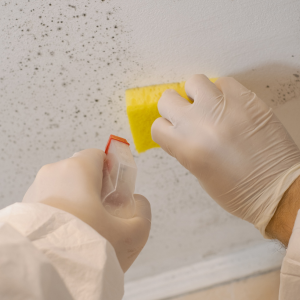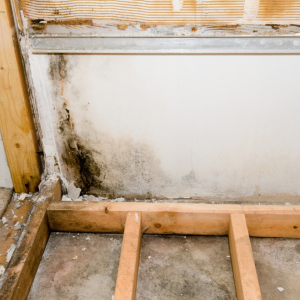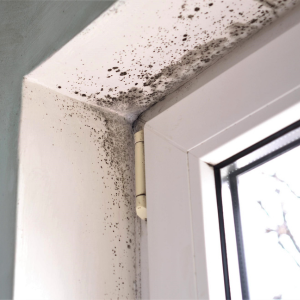
Legal Responsibilities of Selling a Moldy House in Massachusetts
If you’re selling a house with mold in Massachusetts, you have specific legal responsibilities. It’s essential to know about Massachusetts mold regulations and what you’re legally required to do when selling a mold-infested home. Be sure to understand the mold disclosure form and Massachusetts seller disclosure laws. Failing to disclose mold issues can lead to legal trouble or financial fines.

Who Needs to Disclose Mold Issues?
In Massachusetts, sellers must disclose mold to buyers. Due to Massachusetts’ real estate mold laws, this is an ethical and legal duty. Sellers need to inform potential buyers about any mold in the home. This mold-in-home disclosure ensures transparency and protects buyer rights in Massachusetts. Buyers should be aware of any health risks of mold before buying a property.
How Can Sellers Ensure Compliance with Massachusetts Mold Laws?
To follow Massachusetts mold laws, sellers should hire a certified mold inspector. Getting a Massachusetts mold inspector certification guarantees a thorough inspection. Deal with mold issues before listing your house to avoid problems during the sale. Know the Massachusetts environmental health guidelines for mold and understand the mold remediation requirements to stay compliant with the law.
What Documents Are Required During the Sale Process?
Massachusetts real estate inspection requirements necessitate submitting numerous documents regarding mold during the transaction. A mold inspection report is essential when selling a property, as it provides a comprehensive account of mold discoveries. Having precise records, such as mold testing results, is necessary in Massachusetts, as home sellers may be held accountable for mold issues discovered during inspections. Maintaining the organization of these documents will facilitate a seamless transaction and mitigate legal complications.
For personalized help with selling a mold-infested house, contact Naples Home Buyers for advice suited to your situation. We offer guidance to help you meet all legal and safety standards.
Does Mold Affect the Value of a House?
What Factors Influence Property Value?
Several essential factors matter when determining property value. Mold can significantly impact a home’s appeal in the real estate market. Some key influences on home prices include:

- Location: How close is the home to schools, workplaces, and amenities?
- Condition: The overall state of the property, especially if mold is present, can turn buyers away.
- Local Real Estate Market Trends: The current market trends influence how mold affects property value.
Mold often signals moisture problems, which could worry home inspectors and buyers alike.
How Can Mold Impact Buyer Decisions?
Mold issues are a big concern for potential home buyers. Here’s how selling a house with mold might affect buyer decisions:
- Health Risks: The presence of mold in the home can result in health issues, which may cause purchasers to be concerned about indoor air quality.
- Repair Expenses: Prospective purchasers may harbor reservations regarding the expense of mold eradication and repairing any damage.
- Marketability: Homes with mildew may lose value because they often stay on the market longer.
Buyers tend to favor homes without health or safety risks, so mold is an issue that needs addressing.
Are There Ways to Mitigate Value Loss Due to Mold?
To lessen value loss from mold, consider these approaches:
- Professional Mold Remediation: Hire experts to thoroughly clean the mold and prevent future issues.
- Repair Negotiations: Be ready to discuss covering repair costs or offer credits to reassure buyers.
- Improving Property Health: To improve the home’s condition, fix mold-causing causes, like leaks or poor ventilation.
Taking active steps to handle mold can help maintain your property’s value and appeal. For guidance, consult professionals like Naples Home Buyers to tackle these challenges effectively.
Should You Consider Professional Mold Remediation Before Selling?
Selling a house with mold can be challenging, especially in Massachusetts, where buyers are concerned about environmental health standards. Choosing professional mold remediation before listing your home can boost buyer confidence and raise your property’s value. Mold issues pose health risks and may turn away potential buyers if not appropriately handled.

What Are the Benefits of Professional Mold Remediation?
Professional mold remediation provides several benefits:
- Health Protection: It effectively addresses mold problems, improving the health conditions of your property. Mold spores can cause respiratory issues, allergies, and other health risks.
- Property Value: A mold-free home is more appealing to buyers, increasing the chances of a successful sale.
- Thorough Solutions: Professionals use advanced techniques and equipment to ensure complete mold removal, preventing future outbreaks.
- Regulation Compliance: Professionals follow specific standards of Massachusetts environmental health mold guidelines.
Can DIY Mold Removal Be Effective?
DIY mold removal might seem like a cheaper option, but consider its effectiveness compared to professional methods:
- Limited Scope: Home mold solutions may only address surface-level issues, often missing more profound or hidden infestations.
- Effectiveness Concerns: DIY efforts may not altogether remove black mold without proper equipment, leading to recurring issues.
- Health Risks: Handling mold without protective gear and training can expose you to harmful spores.
How Do You Choose a Qualified Mold Remediation Specialist?
Selecting the proper mold remediation specialist is essential. Here’s how to make a wise choice:
- Check Certifications: Ensure the professional has a Massachusetts mold inspector certification, which guarantees expertise.
- Evaluate Experience and Reputation: Look for established mold remediation companies with positive reviews and a strong track record.
- Understand Costs: Get detailed quotes that outline remediation costs and services provided.
- Ask About Methods: Inquire about the techniques and products used to ensure they meet industry standards.
Choosing the right expert will resolve your mold issues effectively and provide peace of mind during home-selling.
For more personalized advice on selling a house with mold in Massachusetts, contact Naples Home Buyers today to discuss your needs.
Is Selling a House with Mold As-Is a Viable Option?
Selling a house as-is, especially with mold issues, can be a sensible choice for homeowners in Massachusetts. By choosing this route, sellers can avoid doing extensive repairs and connect directly with buyers who are open to properties with issues. Opting for a cash offer can make the deal go faster. But, it’s essential to follow disclosure laws to keep things transparent and honest with potential home buyers.

What Are the Pros and Cons of Selling As-Is?
When thinking about an as-is sale, consider these pros and cons:
Pros:
- Avoid Mold Remediation Costs: You save money by not fixing the mold yourself.
- Quick Sale: Cash buyers close deals quickly since they don’t need mortgage approvals.
- Less Stress: You won’t have to worry about fixing up the home before selling it.
Cons:
- Lower Selling Price: You might get a lower offer because of the mold damage.
- Buyer Rights: Buyers could ask for a price cut due to mold concerns.
- Massachusetts Laws: Make sure to follow local laws requiring clear mold disclosures.
Understanding these points helps homeowners decide if selling a home with mold in Massachusetts is right.
How Can You Market a House with Mold?
Marketing a house with mold needs careful planning to reach the right buyers while staying honest:
- Highlight Potential: Despite mold issues, focus on the property’s good features, like its location or size.
- Buyer Protection: Offer assurances to help buyers feel safe.
- Transparency and Disclosure: Be upfront about mold problems to build trust and meet legal rules.
Using smart marketing strategies, sellers can attract buyers who see the property’s value despite its condition.
What Should You Communicate to Potential Cash Buyers?
Clear communication is key when dealing with cash buyers:
- Mold Issues: Explain the extent and location of mold clearly to set expectations.
- Negotiation Flexibility: Be ready to discuss terms, possibly lowering the price for mold repairs.
- Disclosure Requirements: Follow Massachusetts seller disclosure laws to avoid legal troubles and gain buyer trust.
Honest communication with cash buyers can make the sale process smoother and more successful.
How Can Homeowners Prevent Mold Growth Before Listing a Property?
What Steps Can Be Taken to Reduce Moisture?
Preventing mold starts with reducing moisture in the home. Here are some easy steps:

- Inspect and Repair Leaky Pipes: Check pipes often for leaks and fix them quickly to avoid water damage.
- Address Water Damage Quickly: If you see stains on ceilings or walls, act fast to dry and repair those areas.
- Use Dehumidifiers: In damp places like basements, use a dehumidifier to keep humidity low and stop mold.
These actions help homeowners lower the risk of mold so their property stays mold-free before listing.
How Does Ventilation Play a Role in Mold Prevention?
Good ventilation prevents mold by improving air circulation and keeping humidity in check. Here’s how to improve ventilation:
- Improve Air Circulation: Use fans in bathrooms and kitchens to clear steam and lessen moisture.
- Ensure Good flow: Open doors and use ceiling fans to move air through the home.
- Humidity Control: Keep indoor humidity below 60% to make it harder for mold to grow.
Better ventilation makes your home less mold-friendly, helping your property stay valuable and appealing.
Are There Simple Home Modifications That Can Keep Mold at Bay?
Homeowners can make simple changes to help keep mold away:
- Install Mold-Resistant Materials: Use mold-resistant drywall or insulation in moisture-prone areas.
- Seal Porous Materials: Apply sealants on wooden surfaces to stop water absorption.
- Regular Maintenance: Clean gutters and downspouts to prevent water buildup near the foundation.
These affordable prevention measures can significantly lower the chance of mold problems before selling a property.
FAQs:
What steps should I take to sell a house with mold in Massachusetts?
When selling a house, dealing with mold problems right away is crucial. Hire a Massachusetts mold remediation specialist to check and remove the mold. Be upfront about the issue and fix it, as Massachusetts mold laws require. This transparency can help build trust with buyers.
How does mildew differ from mold when selling a home in Massachusetts?
Mildew is a mold that is usually easier to clean and less harmful. You need to address both issues when selling a house. A Massachusetts home inspection will likely cover both, ensuring buyers know about them and the removal steps taken.
Are there specific Massachusetts mold regulations I should be aware of before selling?
Yes, Massachusetts has certain mold regulations sellers must follow, including disclosing mold problems and following remediation rules. Understanding these laws helps avoid legal issues and ensures a smooth sale.
What should a Massachusetts home buyer know about mold testing before purchase?
Home buyers in Massachusetts should ask for a detailed mold inspection and testing, especially if there’s water damage or a past mold history. This information helps potential buyers understand any health risks and mold removal costs.
Is it necessary to hire a mold remediation company in Massachusetts?
Hiring a professional mold remediation company in Massachusetts ensures that they effectively remove the mold and address any underlying issues. Professionals have the skills to handle mold safely and according to local laws.
How do Massachusetts mold-related health risks affect property sales?
Mold-related health risks can lower property value and scare buyers away. Sellers should fully disclose any mold issues and provide details on remediation efforts. This transparency can help alleviate buyer concerns.
Can tenants in Massachusetts demand mold removal?
Yes, tenants in Massachusetts have the right to a safe living space. Once informed, landlords must quickly fix mold issues, or they may face legal action and future property sale problems.
How can selling your house in Massachusetts be affected by mold?
Mold can turn off potential buyers and decrease your home’s value. It’s important to address mold issues through professional cleanup and offer proof of these efforts. Proper disclosure and remediation can make selling your house more successful.
Key Insights
- We help you sell your house in Massachusetts by addressing any mold issues. This includes potential problems in areas like carpet spaces, with the help of certified mold remediation specialists.
- It’s important to understand Massachusetts mold regulations. Disclosure rules can be different by state. Our expert team can guide you through Massachusetts real estate mold laws and buyer rights.
- Conducting mold testing in Massachusetts is crucial to identify harmful molds. We cooperate with Massachusetts mold remediation companies to ensure complete removal.
- Fixing mold issues before listing a house is critical. We offer support on cleaning mold and meeting Massachusetts home inspection mold standards.
- If you’re selling a house with mold, consult a Massachusetts mold expert to understand the risks and liabilities of homeowner mold responsibilities.
- Our services include organizing health risk assessments per Massachusetts building code mold guidelines and ensuring safety for everyone.
- We help clarify if disclosures like Massachusetts tenant mold rights apply to you, reducing liability and protecting your interests.
- Specialized cleanup services for homes in Massachusetts are available. We make sure that molds are removed and environments are safe for buyers.
- Check out our fast and reliable Massachusetts mold removal services, supported by our local expertise, to enhance your property’s appeal.
- For homes in cities like Beverly, Miami, or even those considering Cleveland, Vegas, and Indianapolis, we provide expert advice on preparing your property for sale.
These details apply to the entire state of Massachusetts, including cities like Springfield, Amherst, Greenfield, Huntington, and Hadley, as well as their surrounding areas. If you require extra assistance or have particular inquiries, please contact us at (413) 331-6060. Please see our website, Naples Home Buyers, for more information and complete descriptions of our services.
Sell Your House in Massachusetts For Cash 💰
We buy houses in Massachusetts In ANY CONDITION! We pay CASH and you will not pay any commissions, agents, or fees. Enter your address to get your cash offer in 24 hours or less!
Resources To Help You Sell A House in Massachusetts
Give Us A Call At (413) 331-6060
If you require additional assistance or have specific questions, please do not hesitate to Contact Us at (413) 331-6060. You Can also visit our Homepage at Naples Home Buyers for more information and detailed descriptions of our services.


